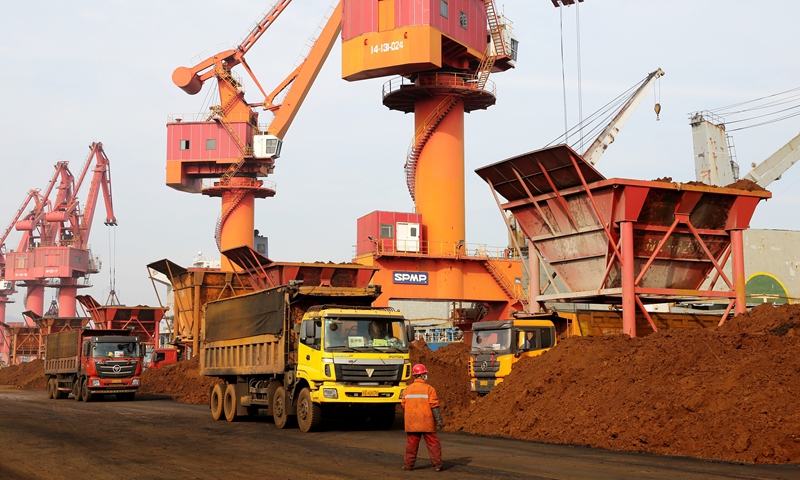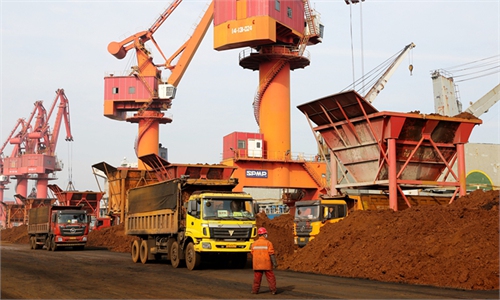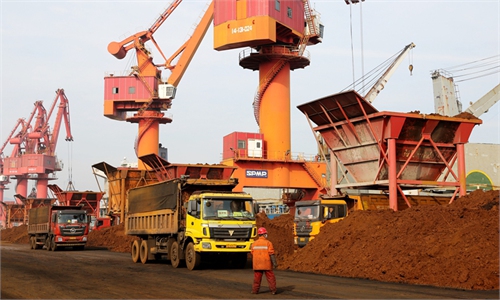China to keep stable price of iron ore, other materials in 2023
NDRC to supervise information providers to prevent false reporting

Iron ore Photo:VCG
China's top economic planner said it will tighten supervision of iron ore pricing and crack down on illegal activities, to keep the market stable, a move that signals authorities are ramping up efforts to maintain price stability after the global market rallied on the nation's reopening from pandemic.
In a Sunday statement, the National Development and Reform Commission (NDRC) said that it has summoned some iron ore information providers over publication of outdated or false "news" that confused the public and had an adverse impact on the market. The providers were urged to carefully verify data and ensure they don't drive up prices.
The NDRC said it will closely monitor industry conditions and iron ore prices, and it will work with relevant departments to further study and take measures to severely crack down on illegal activities, such as fabricating and disseminating price increase information, hoarding and price gouging, so as to effectively ensure the smooth operation of the iron ore market.
The Sunday statement was the second such move to regulate the iron ore industry in 2023 by China's top economic planner.
On January 6, the NDRC said that it was "highly concerned" about the iron ore's market price fluctuations, as it had noticed a recent sharp and rapid rise. "Given the fundamentals of iron ore market supply and demand are generally stable, the rapid price rises are obviously speculative," the economic planner said.
The commodity has rallied sharply in recent months. According to a Reuters report, iron ore futures climbed more than 3 percent on Friday, with Dalian prices hitting their highest in 17 months and stretching gains for the week on continued optimism about growing demand by top steel producers China.
Moreover, crude oil prices settled more than $1 a barrel higher on Friday, notching the biggest weekly gains since October, as "more indicators pointed toward growing demand from top oil importer China," Reuters said.
"Sentiment has been relatively strong, which offers some 'space' for speculation. Industry players are also betting on the kick-off of some big infrastructure projects, as well as stabilizing real estate market after the optimization of the COVID-19 strategy and other supportive measures from the central government," Zhang Hong, an independent market observer, told the Global Times on Sunday.
But Zhang said the domestic iron ore market remains generally in a stable situation, and demand for steel remains soft as the Spring Festival holidays come. "We're expecting a surge in demand after February," Zhang said.
China's imports of iron ore in December fell 8.1 percent from the previous month to 90.86 million tons, customs data showed on Friday. In the full year of 2022, China imported 1.11 billion tons of iron ore, down 1.5 percent from a year earlier.
Observers noted that the warning was in line with the central government's effort to maintain stable prices for people's livelihoods, which has been a priority in government policy in recent years.
China's consumer price index (CPI) rose 2 percent year-on-year in 2022, said the National Bureau of Statistics (NBS) on Thursday.
That rate is well below those of major developed economies, with the US CPI rising 6.5 percent in December and the eurozone rate at about 9 percent. Major emerging market economies like India, Brazil and South Africa reported spiking inflation between 7-10 percent from January to November of 2022, according to Wan Jinsong, director of the Price Department at the NDRC.
Wan said that although imported inflationary pressures still exist in 2023, there is a solid foundation for maintaining stable prices in China, citing solid foundations including a bumper grain harvest, reasonable hog production, and a sufficient supply of energy and other bulk commodities.
With China's optimized measures on COVID-19 prevention, the CPI is expected to edge up gradually, as consumption and business activity are reviving rapidly, Hu Qimu, deputy secretary general of digital-real economies integration forum 50, told the Global Times.
In December, the CPI rose 1.8 percent, up from 1.6 percent in November, NBS data showed.


